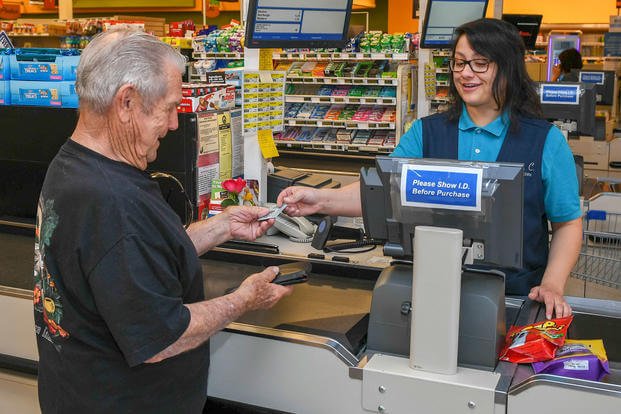Just how the Defense Department will allow an estimated 3.5 million veterans and their caregivers on base early next year to use commissaries, exchanges and some recreation resources is still largely unanswered, despite a looming deadline and potentially complicated access issues.
Beginning Jan. 1, 2020, all service-connected disabled veterans, caregivers enrolled in the Department of Veterans Affairs' Comprehensive Assistance for Family Caregivers program, and former prisoners of war will be able to shop at on-base grocery stores and exchanges. They will also be allowed to use some MWR amenities, such as golf courses and bowling alleys.
Congress extended that access as part of 2019 National Defense Authorization Act. But before shoppers can start using the stores and services, the Defense Department needs a plan for easily getting them onto secure military installations.
The DoD announced early this year that part of its plan relies on letting veterans who hold a Veterans Health Identification Card use it as their base ID card. Officials also said they plan to issue access cards to veterans and caregivers who don't hold that form of ID; users will be able to receive those cards by presenting a letter of eligibility from the VA.
Related: Millions More Vets and Caregivers Are About to Get Commissary, Exchange Access
But neither officials with the VA nor the DoD were able to offer access details early this month.
Although DoD officials initially said they anticipated a policy in hand this week on when and where veterans and caregivers can start applying for the access cards, as well as on how bases and commissary stores will manage the expected influx of visitors, that rollout has been delayed, they said.
And officials with the VA were unable to say how or when veterans who had received a disability rating through the VA system and caregivers enrolled in the VA's program would be able to access verification letters.
A VA spokesman referred all questions about access to the DoD.
"The Department of Defense is in charge of implementing the expanded patronage effort, and we refer you to DoD for comment," the spokesman said in an email.
On top of the 5% surcharge all commissary customers must pay, new customers will have to pay a 1.9% fee when using a commercial credit card at the commissary and 0.5% fee for debit cards. There's no extra charge when paying by cash, check or using the credit card offered by the military resale system, the Military Star card.
— Dorothy Mills-Gregg can be reached at dorothy.mills-gregg@military.com.
Read more: Retired Air Force General Charged with Possession of Child Porn











